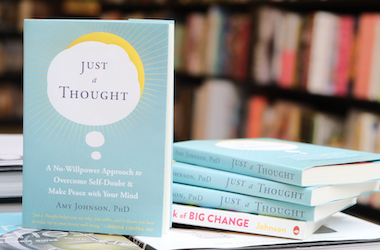Binge Eating Disorder (BED) is the most common eating disorder in America, affecting roughly 3% of the population. That’s probably an understatement, and that’s still millions of people. 
And although BED is the most prevalent diagnosed eating disorder, it is also the most misunderstood.
BED has nothing to do with willpower or discipline. It’s not even about food in some cases, although binge eating large quantities of food is the outward behavior we’re talking about.
Like all habits and addictions, binge eating is a poor but well-meaning strategy for self-soothing. It is your best attempt at feeling better in the moment, even when you intellectually “know better”.
If you or someone you love is suffering with this extremely common issue, this class will point you toward recovery. I have left this issue completely behind in my own life, as have countless others. There is so much hope for you.
10 Big Ideas
1. BED is a sign of your innate mental health
Sounds crazy, I know. But think about it this way: Your default state is wellness. You are designed to reside in peace of mind, enjoying a nice feeling, most of the time.
When you aren’t there, you do what you can to get back there. You intuitively recognize peace of mind as “home” and do whatever you can to feel like “yourself again”.
Unfortunately, those attempts to feel good again often involve turning to things outside of yourself to calm and soothe your busy mind. That’s where habits and addictions—like binge eating—come in.
As much as it may feel like you are “sick”, “flawed”, or doing things “all wrong”, your binge eating is a sign that there is fundamental health, wellness, and peace at your core to which you are striving to return.
2. You are always doing the best you can
Although we’re always trying to get back to our healthy, peaceful home base, our methods for doing so aren’t always so great. Your state of mind and our perspective is limited, especially when you’re not feeling well.
When you aren’t seeing clearly, you’re likely to fall into habits and addictions that have a proven track record of helping relieve your suffering in the short term, but that compound your problems in the longer term.
The point here is that you are always doing the best you can with the thinking and perspective you have available to you. In the light of day, it is obvious that eating a half gallon of ice cream wasn’t going to solve any problems. But in that moment, it was the fastest, easiest path toward relief.
3. It’s not about lack of willpower; it’s about misunderstanding
Binge eating has absolutely nothing to do with a lack of willpower. In fact, many people with this issue are extremely accomplished and disciplined in other areas of their life.
Just as lack of willpower is not the problem, engaging willpower is not the solution. Willpower and discipline alone might help in an isolated case or two, but they are most likely not what will help you recover permanently. Coming to view your habit and the urges that underpin it differently is the way deep, lasting change occurs.
4. Hijacked by your habit—the lower brain
Think of your brain as divided into two parts. The lower brain is the older, more primitive part of your brain. It is responsible for habitual behavior patterns and for keeping you alive. Your survival instincts originate in your lower brain.
The higher brain is more advanced, responsible for logic, reasoning, and intellect. The lower brain can be wired to react, but the higher brain makes conscious decisions that can sometimes override the lower brain’s quick reactions.
You know those sudden, overwhelming urges you feel to binge eat? They are coming from the lower brain. When you’ve binged in the past, your brain was flooded with feel-good chemicals. That reaction “taught” your lower brain that acting on urges to binge leads to you feeling better.
So now, your well-meaning and unintelligent lower brain produces urges that make you want to binge eat again. When you don’t know better, those urges can feel like they completely take over. You feel hijacked by your lower brain and its powerful urges to binge.
You are not truly hijacked though. Your higher brain is still fully functioning and no matter how taken over you might feel, you can learn to choose—via your higher brain—to not give into those urges.
5. Urges are temporary
The urges that well up within you, that leave you feeling like you MUST eat NOW, are simply conditioned reactions from the survival-based lower brain. They feel like matters of life or death, but they aren’t.
In fact, as uncomfortable as they feel at times, they actually don’t require action at all. They are self-correcting because they are temporary.
Those urges that feel so hijacking—the one’s you’ve given into many times because it felt like your only option; the fastest way to make them go away—will go on away on their own.
Good to know, huh?
6. Action and attention are not helpful
All human experience is temporary—even urges to binge.
Everything comes and goes, by nature. The problem is, no ever told us that. When we don’t deeply see how impersonal and fleeting our human thoughts, emotions, and experiences are, we can easily get caught up in them, fearing that they will never end.
When we get caught up—fearing, resisting, trying to solve or fix our experiences—our focus on them ironically keeps them around that much longer.
Imagine the whole of your human experience as a rushing river. The river is always flowing. The water coming your way is meant to keep moving, being replaced with fresh water, all the time. The same is true of your inner experiences.
When we are uncomfortable with our experience or it looks like something we need to change or manage, it’s like we step in the middle of the flowing river with all sorts of logs and boulders. Then we wonder why the water isn’t flowing.
As you come to see this, it becomes more natural to dismiss them rather than act on them.
7. Insight changes everything
Seeing a deeper truth about your binge eating habit is what allows it to change.
I know the behavior looks like the problem. But remember Big Idea #1—the behavior is the symptom of a lack of connection, a feeling of dis-ease. Binge eating is a symptom of not feeling at peace and of not deeply seeing the temporary, harmless nature of your human experience (i.e., urges).
It’s so easy to get caught up in the behavior, focusing on behavioral fixes. But look deeper.
8. Patience and Presence fix every problem
When I was suffering with BED, it looked to me like something I needed to get to the bottom of. I thought I needed to understand every cause, trigger, and consequence of my binges. I thought I needed to figure out a way to stop binge eating.
What I gradually came to see is that not binge eating is innate and natural. I innocently taught myself (and my lower brain) to binge eat. But in the absence of all the stuff I unfortunately taught myself—when I was at my peaceful, default state, present in the moment—it didn’t appeal to me. From that place, I could handle any painful emotions or experiences that came my way.
Because all experience is fleeting and you are equipped with infinite inner wisdom and guidance…and because binge eating is not something fundamental to you (it is a learned habit, piled on top of your healthy nature)…being present in the moment rather than lost in learned thought is all you ever truly need.
There is guidance, wisdom, common sense, and infinite peace of mind in this moment, right here, now.
9. The truth about setbacks
As you begin leaving your binge eating habit behind, you’ll probably experience setbacks. Those setbacks do not matter in the least.
The only potential problem with a setback is that you might believe it means something. You might take it seriously, as a sign of your inability to change, and that would be a horrible (but understandable) mistake.
Setbacks are a normal, meaningless part of the journey. They are absolutely nothing to worry about.
10. Lifelong recovery
Permanent, lasting recovery is not only possible, it is probable. You should expect it.
When you see the truth about why you have this habit and when you see the truth about your urges, things begin to unravel.
You’ll see that you’re acting out of misunderstanding. You’ll be equipped to tap into exactly what you need to feel whole and complete as you are. As you stop acting on urges, urges weaken and fade.
There is so much hope for you.






Thankyou…for years I have blamed myself and lived in shame…this makes total sense to me…I am an ex smoker and no longer obsess, use, or think about smoking. I can remember the strong urges I had . I had to tell and train my lower brain, that I was no longer a smoker. I had to just endure being uncomfortable. That was 25 years ago! Freedom!